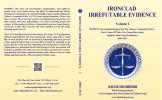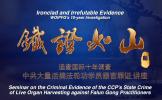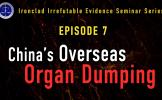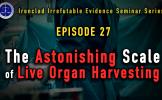Report on Live Organ Harvesting Crimes in China (Updated July 2024)
Introduction
Forced live organ harvesting refers to the criminal practice of removing a living human’s organs, without their consent. In China, victims are often not even administered anesthetics. Organs from such victims are called fresh organs and fetch a higher price. Victims’ bodies are destroyed and even their families never find out what happened to them. Most victims just disappear without a trace.
Forced live organ harvesting in China, is a state-sanctioned program. Every year, it’s estimated tens of thousands of such transplants are carried out as part of a nationwide industry— worth over a billion dollars annually. Surgeons assist with robbing the victims’ organs while they’re conscious, before murdering them. So, doctors and nurses are also complicit in the mass slaughter.
Most of the victims are Falun Gong adherents. Since the persecution of Falun Gong practitioners started in 1999, China has adopted a policy of eradicating followers of this peaceful, spiritual group. Also, due to their qigong practices, it’s known by the CCP government that practitioners enjoy especially good health. Their organs are sought after for this exact reason. So, the forced live organ harvesting serves multiple evil purposes for the CCP. It allows the Chinese government to eradicate Falun Gong practitioners and makes the CCP enormous profits.
After 1999, China saw a rapid establishment of a great many organ transplant centers and tissue typing facilities. Many hospitals and medical departments, which were not qualified to perform organ transplants in the past, were quickly converted into organ transplant centers.
Our investigation started in March 2006 after we received a report that a boiler room for heating, at a hospital in northeast China, was also used to cremate dead bodies. Since then, we have collected over 4,000 pieces of evidence regarding the forced live organ harvesting in China. 66 out of 866 investigative audio recordings confirmed the CCP used Falun Gong practitioners’ organs to do transplants.
This Crime
- Ordered by the highest ranking official of the CCP — Jiang Zemin
- Operated by military, judicial, and medical system since 1999
- Wide-spread across the country
Currently, it’s impossible to know the actual scale of China’s transplant industry. There is conflicting information between the officially reported numbers and those we discovered in our investigation. However, our research offers some estimates of actual numbers, which give a rough sense of what’s really going on.
The World Organization to Investigate the Persecution of Falun Gong (WOIPFG) Was founded on January 20, 2003. Its mission is to investigate the criminal misconduct of institutions and individuals who have persecuted Falun Gong, to bring such in-depth investigations to full disclosure, to exercise the fundamental principles of humanity, and to restore and uphold justice in society.
All information in this report is based on true recordings and archived documents.
Table of Content
Part I Forced Live Organ Harvesting Cases Page 1-6
Part II Crimes Supported by Top Officials Page 7-9
Part III Transplant Activities in Different Regions Page 10-18
Part IV Questions and Answers Page 19-28
Part I Live Organ Harvesting cases
Case One
- Whistleblower: A hospital employee who walked into the crime scene
- Report Time: December 2020
- Crime Date: April 28th, 2019
- Crime Location: The Infectious Disease Department of the PLA 211 Hospital, Harbin, Heilongjiang Province
- Criminal Suspect: Chinese transplant doctors
- Victim: Falun Gong Practitioner Zhang Xiuqin (46 years old)
Discovery:
A female Falun Gong practitioner living in northeast China was tortured and raped for her belief. In April 2019, only one of her kidneys was extracted because her other organs were damaged from beating, and not suitable for transplant. They thought she died and left her alone in the operating room. When a medical staff, not connected to the crime, came to do the cleanup. The Falun Gong practitioner woke up and asked for help disclosing the crime. That person was moved by her bravery and agreed to record her words. The victim died afterward. This is the only first-hand evidence we’ve collected from a victim, so far.
Why was she taken to the infectious disease department? Because victims’ remains were treated as infectious material and would be destroyed completely.
The following are her final words:
“Please remember, I am one of the Falun Gong practitioners who are murdered through forced live organ harvesting. My name is Zhang Xiuqin. They took me here this morning and removed one of my kidneys by force. I’m still alive now. This is the forced live organ harvesting crime that the CCP is afraid to admit.”
“A few dozen of us were detained together. One after another was taken out. Nobody knows where they were taken to. Over the years, countless Falun Gong practitioners’ organs have been harvested while they’re conscious.”
Case Two
- Criminal Suspect: Dr. Li Guowei, organ coordinator from Kidney Transplant Department of Xijing Hospital
- Investigation Time: January 2020
- Crime Location: Xijing Hospital
- Victim: Falun Gong practitioners between 15-30 years old
Discovery:
When an undercover investigator asked the doctor if he could find a kidney from a Falun Gong practitioner, the doctor responded, “I understand what you mean”. Soon after he heard, the investigator was going to give him one million Yuan (~ $153,000) as a “good faith” payment, he promised to find a high-quality organ from a living person as young as 15-20. The doctor even offered to take the undercover investigator to the hospital’s bedside for verification. Finally, the doctor admitted Falun Gong practitioners’ organs were specifically called high quality organs without disease, to conceal the crime.
The following are the criminal’s description of organ “donors”:
“People under 30 years of age don’t have primary illnesses. We are talking about 30-year-olds. If you’re lucky, we may find someone in his 20s, or younger than 20– between 15 and 20 years old. This is all possible. It all depends on your luck.”
“In fact, we don’t say that they are from Falun Gong (practitioners). They are high-quality organs without primary illness.”
“High quality kidneys are those from young people under 30 years old. They(hospital doctors) will do preoperative check-ups on these people, like ultrasound and kidney function tests (to make sure they’re healthy). The so-called Falun Gong kidney you’re looking for actually meets these two criteria (Young and healthy).”
“Technically, the high-quality kidney is the same as the Falun Gong’s organs you’re talking about. I understand what you mean.”
|
Investigator: “You’re in China and you can’t openly say you use Falun Gong practitioners’ organs to do surgeries. In an alternative way, you say it is a high quality type without primary illness.” Dr. Li: “Right, right. That’s the way to say it. It’s the correct way to say it!”
|
Case Three
- Witness: A military policeman who was assigned by the CCP to guard the crime scene
- Report Date: December 12, 2009
- Crime Date: April 9, 2002
- Crime Location: Shenyang, China
- Criminal Suspect: Two Chinese military doctors
- Victim: A female Falun Dafa Practitioner in her 30s
Discovery:
This is the first testimony we obtained from a person who was present at the forced live organ harvesting crime scene. He was furious about what the two military doctors and his supervisor had done to the female Falun Gong practitioner. His experience left him with a great deal of mental distress. 7 years later, he contacted overseas Falun Gong practitioners to disclose the crime. He knew his action would put him at tremendous risk but hoped he could encourage others to stand up to tell the truth.
The female Falun Gong practitioner, a school teacher, was arrested for her belief and was beaten and raped during her detainment. She was taken to a psychiatric hospital where two military doctors extracted her organs without using any aesthetics, while she was still conscious.
The following are the witness’s description of the atrocity:
- “After the scalpel, the scalpel stabbed her in the chest, the blood was squirting and splattering out…the blood was squirting and splattering out. It was not (flowing out)…”
- “They didn’t give her any anesthesia. When they slit her chest with a scalpel, their hands did not shake at all.”
- “She erupted with a howling sound when they cut her open…that woman shouted, ‘Falun Dafa is great’.”
- “They took her heart out first, and then extracted her kidneys. When they cut the blood vessels around her heart with scissors, she was convulsing with a horrifying sound…”
- “What they are doing is a closely guarded secret. Only two or three people secure the site, which protects the military doctors’ safety when they harvest organs.”
Case Four
- Whistleblower: Mr. Lu Shuheng, a California resident
- Report Time: October 2, 2016 in California, USA
- Criminal Suspect: Zhou Qing, a female Chinese surgeon, the whistleblower’s relative
- Crime Location: Shanghai Armed Force Hospital
- Victim: Falun Dafa practitioners
Discovery:
Zhou Qing, the sibling of Mr. Lu’s sister-in-law, was a doctor in Shanghai, China. During a family gathering, she and her husband hoped Mr. Lu to introduce American patients to China to get transplant surgeries. They guaranteed that not only he would earn a lot of money, but also the organs were fresh and from people still alive.
Dr. Zhou Qing was an OBGYN surgeon for years before she performed transplant surgeries. Through his sister-in-law, Mr. Lu learned that when victims were taken into the operating room and strapped down, they were shouting “Falun Dafa is good!”. When Dr. Zhou cut her conscious victims open, they screamed in agony because the area around target organs weren’t anesthetized. The Chinese surgeons believe the less anesthetics, the better the organs would be. Later, due to having nightmares and mental disorders, Dr. Zhou Qing couldn’t do the gruesome transplants any longer, although they brought her lots of money.
Case Five
- Whistleblower: Ushio Sugawara (Japanese), former Yamaguchi-Gumi gang member
- Report Date: June 20, 2022 in Tokyo, Japan
- Crime Date: August 2007
- Crime Location: Beijing Armed Police General Hospital
- Criminal Suspect: Chinese transplant doctors
- Victim: A young male Falun Gong practitioner, 21 years old
Discovery:
Back in 2007, Mr. Ushio Sugawara was still with the Yamaguchi-Gumi gang. His friend’s brother needed human albumin for his liver transplant in Beijing. He purchased it in Japan and delivered it to Beijing. When he visited the patient the day before his surgery, an organ coordinator told him the “donor” was right next door. He was a 21 years old Falun Gong practitioner. The tendons in his hands and feet were cut to prevent his escape. It’s also done to keep the victim from curling up tightly in fear and pain and possibly damaging the target organs.
It only took one month for the Beijing Armed Police General Hospital to find a matching organ for the Japanese patient.
During Mr. Ushio Sugawara’s visit to the patient, he also saw patients from other countries to have transplant surgeries there. This is evidence of organ transplant tourism that happened after 1999. The high availability of organs, short wait times for organ transplants, and relatively inexpensive organs for sale attracted international patients. The Phoenix Weekly from Hong Kong discussed the issue in November 2013. The article “The Veiled Reality of the Human Organ Trade in China” said, “In the past decade, traveling to China for organ transplants has become increasingly popular. In China, organs seem to be available all the time with very little wait time needed; the matching procedures are done quickly.”
Case Six
- Criminal Suspect: Chen Qiang, a kidney broker of the 307th Hospital of the Chinese People's Liberation Army
- Investigation Time: April 10, 2007
- Victim: Falun Gong practitioners
Discovery:
Mr. Chen Qiang admitted that he trafficked Falun Gong practitioners’ organs for transplant surgeries. His higher-ups would provide documents to prove an organ was from Falun Gong practitioner. Also, he promised that the undercover investigator could look and verify the “donor” was alive before killing him.
Mr. Chen said Falun Gong practitioners were transported from Beijing to other cities’ prisons and were coded if they didn’t provide their names. Back then, if Falun Gong practitioners refused to renounce their beliefs, not only they lost their jobs, but their family members and supervisors would lose jobs as well. What’s more, their children were discriminate against and even not allowed schooling. In order to avoid implicating others, many Falun Dafa practitioners refused to give their names upon arrest.
Because of this, there were countless untraceable Falun Gong practitioners in China. This would have made them the ideal group from which to harvest organs.
Mr. Chen stated the business was running through a network. He was connected to top government officials and had people in different departments from military, public security, and medical systems. This is the first time we got to how Falun Gong practitioners’ organs were trafficked in China.
Part II Crime Supported by Top Officials
The state-sanctioned crime committed against Falun Gong practitioners was ordered by Jiang Zemin, then president of China. Our investigation confirms it.
“After President Jiang issued the order to crack down(Falun Gong), we worked on many approaches to fight against Falun Gong. “
Bai Shuzhong, former Minister of the Health Division of the PLA General Logistics Department(controls the military healthcare system) [September 2014]
Bo Xilai, the former Minister of Commerce, followed Jiang Zemin’s instruction and systematically persecuted Falun Gong in order to advance his political career. On September 13, 2006, during his visit to Germany with a delegation, an undercover investigator asked him, “Did Jiang Zemin or you order to harvest Falun Gong practitioners’ organs?” He answered, “ President Jiang !”
Investigator: Jiang Zemin authorized to extract and sell Falun Gong practitioners’ organs. Every hospital is following the order. The CCP ordered you to do it, right?
Tan Yunshan: Yeah, correct.
Dr. Tan Yunshan, director of the Liver Pathology Department of Zhongshan Hospital at Fudan University [February 8, 2015]
Investigator: He (Jiang Zemin) issued an order to use the imprisoned (Falun Gong) practitioners’ organs. You did it because that was Jiang Zemin’s order. Is this correct?
Dr. Gong: Yeah.
Dr. Gong, a cardiothoracic surgeon at Tongji Hospital [October 12, 2015]
|
The Politburo Standing Committee (PSC) is the CCP’s highest decision-making body when the Politburo is not in session.
|
Li Changchun was a member of the PSC from 2002 to 2012. On April 17, 2012, an undercover investigator asked if he knew anything about forced live organ harvesting, he responded, “Contact Zhou Yongkang. Zhou oversees this. He knows about it.” [April 17, 2012]
Zhang Gaoli was a member of the PSC from 2012 to 2017. In June 2015, while Zhang was on an official visit to Kazakhstan, he promised to an undercover investigator over the phone that he would stop the investigation of forced live organ harvesting during committee meetings.
[June 4, 2015]
Liang Guanglie is the former Minister of National Defense and a retired PLA general. In May 2012, during a call with an undercover agent, Liang confirmed that the military held Falun Gong practitioners for organ harvesting and the Central Military Commission had meetings to discuss this matter. [May 2012]
|
The Central Political and Legal Affairs Commission (PLAC) of the Chinese Communist Party oversees all of China’s legal enforcement authorities, including the police.
|
Zhou Benshun was a former Chief of Staff of the PLAC. He served under Zhou Yongkang, one of the top CCP leaders who managed the persecution of Falun Gong practitioners and the crime of organ harvesting. In November 2008, Zhou Benshun went on a visit to Australia. An undercover investigator telephoned him to inquire about the organ harvesting system in China. Zhou said, “Regarding the issue of live organ harvesting from Falun Gong practitioners, it does exist in our country.”
Wei Jianrong was a former Vice-Director of the Office of the PLAC. On September 26, 2008, he admitted to our investigator, “It (Organ harvesting from detained Falun Gong practitioners) started a long time ago.”
On April 13, 2012, Tang Junjie, a former deputy Secretary of the PLAC’s Liaoning branch., revealed three things in his response:
1) The PLAC oversaw the crime of harvesting organs from Falun Gong practitioners.
2) Top CCP leaders played an important role in the crimes’ implementation and paid special attention to it.
3) The crimes are widespread.

On the night of April 19th, 2016, Gao Yixi, a 45 years old Falun Gong practitioner was kidnapped by the Mudanjiang police with his wife. Nine days later, Gao was taken to Mudanjiang Public Security Hospital by the police to have a complete health checkup and the result showed he was healthy. But, in less than 48 hours, the hospital pronounced him dead and at about 3pm the same day, the police told his family members that, whether they agreed or not, Gao must immediately be autopsied. One hour later, from 4pm to 7pm, his cerebrum, cerebellum, heart, both lungs, liver, gallbladder, spleen, and both kidneys were all taken out.
On June 21, 2016, an overseas Falun Gong practitioner called Zhu Jiabin, the head of the general department of the “610 Office” in Mudanjiang City(Heilongjiang Province), about what happened to Gao Yixi. Zhu blatantly admitted they harvested and sold his organs.
Part III Transplant Activities in Different Regions
|
Beijing
Chen Qiang,
Kidney transplant broker
The 307th Hospital of
the Chinese People's Liberation Army
Beijing
April 10, 2007
In China, the Red Cross Society is officially authorized to take organ donations since 2015.
|
Director Wang Zhaohui: “Our office (Red Cross Society) hasn’t started to work with the Health and Family Planning Commission yet. The hospitals usually find organs on their own.” |
Wang Zhaohui, Director of
the Preparatory Office for Organ Donation Project,
Beijing
September 6, 2018
|
Investigator: Are you using healthy organs from Falun Gong practitioners? Dr. Wang Jianli: Yes, yes. |
Dr. Wang Jianli
Deputy director of the Organ Transplant Institute of
Beijing Armed Police General Hospital
November 2, 2018
|
Investigator: Are you still using Falun Gong practitioners as your regular liver sources? Dr. Lang Ren: Yes, yes |
Dr. Lang Ren, Director of
the Liver Transplantation of Beijing Chaoyang Hospital
November 6, 2018
|
Investigator: Someone said your clinic is closed during the pandemic. Nurse: We’re always open. We’re always open. Investigator: Do you mean the liver transplants aren’t stopping? Nurse: Correct. |
Nurse from the liver transplant unit
Beijing Chaoyang Hospital
September 1, 2020
Tianjin
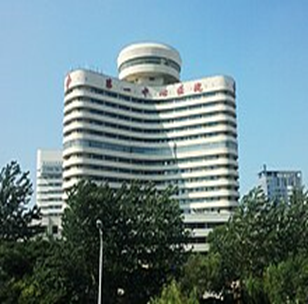
With the investment from the local government, in 2006, Tianjin First Central Hospital opened a new transplant center with 16 floors and more than 500 beds. This made it the largest organ transplant hospital in Asia.
The First Central Hospital did 507 liver transplants in 2004. During the first month of 2005, the hospital did 108 liver transplants and 43 kidney transplants.
Chinese media reported, Dr. Shen Zhongyang from Tianjin First Central Hospital, as of March 17, 2005, had performed 1,600 liver transplants. As of December 14, 2014, he had performed almost 10,000. That is nearly 8,400 more liver transplants in about 9 years. Dr. Shen works for both military and civilian hospitals. He helped develop organ transplant departments by lecturing at more than 66 hospitals in 22 regions of China. As a liver transplant expert, he trained a large number of transplant doctors in various places across China.
Investigator: There have just been over one hundred donated organs between 2003-2015, right?
Red Cross Employee: Yes, right, right.
[Tianjin Organ Donation office, December 11, 2015]
Investigator: Did your hospital do many liver transplants this year?
Doctor: Our hospital does a few hundred liver transplants a year.
[Doctor from Liver Transplant Department of Oriental Organ Transplant Center, Tianjin First Central Hospital,
July 21, 2016]
Investigator: How many liver transplants have you done in 2016?
Doctor: A few hundred.
Investigator: Is it one hundred or two hundred? Could you be more specific?
Doctor: 300-400 cases. [Doctor from Liver Transplant Department of Oriental Organ Transplant Center, Tianjin First Central Hospital, January 1, 2017]
Investigator: You do 400-500 liver transplants a year. Can you do as many kidney transplants a year too?
Dr. Feng: Almost that many.
[Dr. Feng from Kidney Transplant Department, Tianjin First Central Hospital, October 17, 2017]
Investigator: How long would the wait be for a liver transplant?
Doctor: One or two months.
Investigator: My friend said you can do over 1,000 cases a year?
Doctor: More than that. We have several teams and each one can do several hundred.
[Docter from Liver Transplant Department, Tianjin First Central Hospital, May 4, 2018]
Shanghai
Investigator: Are there some organs from Falun Gong practitioners? I heard that this kind is generally very good.
Doctor: What we have here is all this type.
[A surgeon of the liver transplantation center, Zhongshan Hospital of Fudan University, Shanghai, March 16, 2006]
Investigator: Are you still using the Falun Gong organs?
Dr. Hang Hualian: Yes, definitely.
[Hang Hualian, Deputy chief physician of the Department of Liver Transplantation of Shanghai Renji Hospital, November 8, 2018]
Investigator: How many organ donations have you gotten since the program established(2014) ?
Red Cross staff: Shanghai received 5 organ donations.
[Red Cross Society at Huangpu District, Shanghai, December 17, 2015]
Nurse: “We have liver transplant patients every day. We do quite a few every day.”
[The 3rd Unit of Hepatobiliary Surgery at Xinhua Hospital, Shanghai Medical University, December 3, 2020]
Investigator: About how many transplant surgeries does your hospital do per year?
Nurse: We probably did over 300 last year (2021).
[A nurse from the Surgery Department, Zhongshan Hospital at Fudan University, Shanghai, April 30, 2022]
Northeast
Annie: “My ex-husband and I worked at this hospital from 1999 to 2004. My ex-husband was a brain surgeon, and did surgeries to remove Falun Gong practitioners’ organs. I am here to apologize to you on his behalf. I once heard my ex-husband say that most of them were strong, and still breathing when their organs were taken out. After that, some of the bodies were immediately thrown into cremation furnaces and disappeared without a trace.”
[Annie, an ex-nurse Liaoning Thrombosis Treatment Center of Integrated Chinese and Western Medicine, Shenyang, On March 9, 2006]
Investigator: I know that since 2001, hospitals have been getting kidneys from young, healthy Falun Gong people via courts and detention centers. Can your court still provide such organs?
Court policeman: It depends, and you must discuss it with our superior. If your financial conditions are good, we might still be able to provide it.
[Criminal court policeman from Jinzhou City People’s Intermediate Court, May 22, 2006]
Investigator: You participated in the persecution of Falun Gong and sold Falun Gong practitioner Gao Yixi’s organs. We will thoroughly investigate this matter and hold you accountable for what you have done. Do you realize it?
Mr. Zhu Jiabin: Just chase me down! I am the biggest badass in the world! What I am afraid of? My name is “butcher”. [Zhu Jiabin, the head of “610 Office” of Mudanjiang, Heilongjiang, June 21, 2016]
In June 2017, the Hepatic Transplantation Center of the First Hospital of Jilin University offered 10 free liver transplants for children. The hospital president confirmed they already had organ donors before getting patients.
Investigator: The 10 free liver transplants make me feel you already have liver donors, right?
President Hua Shucheng: Yes, yes.
[Hua Shucheng, President of the First Hospital of Jilin University, June 13, 2017]
Investigator: How many do you perform a year?
Doctor: We did more than 200 cases last year (2019).
Investigator: I want the type of organ from Falun Gong.
Doctor: I can’t help with that. But if you want it, you can directly contact our director.
[Doctor from the Urology Department of The First Hospital at Jilin University, September 9, 2020]
South
In 2003, Dr. Tan Jianming, a surgeon from the kidney transplant center of the General Hospital at Fuzhou Military Region, tested eight different kidneys for one patient during a two month hospital stay. Finally the eighth kidney was successfully matched.
[Bloody Harvest: Revised Report into Allegations of Organ Harvesting of Falun Gong Practitioners in China, Co-authored by David Matas and David Kilgour]
Investigator: Do you have kidneys from Falun Gong detainees?
Dr. Zhu Yunsong: We have a few [from Falun Gong]. If you’d like to come, it definitely can be arranged before May 1.
[Zhu Yunsong, director of the Organ Transplant Department, General Hospital of Guangzhou Military Command of the PLA, April 12, 2006]
Investigator: Where did you find the organs in the past? In detention centers or prisons?
Dr. Lu Guoping: We found them from prisons.
Investigator: Were they all healthy Falun Gong people?
Dr. Lu Guoping: Yes, yes.
[Dr. Lu Guoping, a doctor from Kidney Transplant Department at Guangxi Ethnic Hospital, May 22, 2006]
Investigator: Have you been able to do many transplants recently?
Dr. Yang Zhijian: Yes. We had 30 kidney transplants in July.
Investigator: 30 transplants in 1 month?
Dr. Yang Zhijian: Correct.
[Dr. Yang Zhijian, Hepatology Department of PLA 181 Hospital, Guilin, Guangxi, September 1, 2016]
“We did over 400 kidney transplants a year. We have more than 10 chief surgeons.”
[A doctor from the Kidney Transplant Hospital, The PLA 303 Hospital, Guangxi, September 27, 2021]
Investigator: Your hospital has done successful kidney transplants, how many…?
Nurse: We do 200-300 a year.
[A nurse from the third People’s Hospital, Shenzhen, February 18, 2022]
East
Investigator: Do you have livers from Falun Gong practitioners?
Doctor: As long as you come over. We are surely going to have this type of “donor”. And this type of “donor” will become much more available in April.
[A doctor at the Liver Transplant Center of Qianfoshan Hospital, Shandong,
March 16, 2006]
Investigator: Do you have organs from Falun Gong practitioners? I heard their organs are very healthy.
Dr. Shen Zhenya: We have them but not as many as before. We still have some.
[Shen Zhenya, Director of the Cardiovascular Surgery and Research Office, The First Affiliated Hospital of Suzhou University, Jiangsu,
May 6, 2014]
Dr. Chen Yongfeng: If you decide to come get a liver transplant and the patient isn’t in a medical emergency, I can choose a good younger donor for you...The wait is about one week.
[Dr. Chen Yongfeng, The Liver Transplantation Department of Zhengzhou People’s Hospital, June 26, 2015]
Investigator: How long will he have to wait for the transplant surgery?
Dr. Zheng Shusen: We probably can do it within two weeks.
[Dr. Zheng Shusen, President of Shulan Hospital, Hangzhou, November 3, 2018]
Investigator: Did the transplant surgeries stop during the pandemic?
Nurse: No.
[Nurse Gong of kidney transplant unit of Urology Department, The First People’s Hospital of Changzhou, Jiangsu, October 5, 2020]
Central
On January 1, 2015, the CCP announced a claim that they no longer used executed prisoners’ organs. The CCP also claimed citizen donations were their only source of organs for transplants.
Investigator: We are looking for organ transplants from Falun Gong. Is that possible?”
Nurse: Sure.
[A nurse from the Urinary Surgery Department at Tongji Hospital, Wuhan, March 30, 2006]
Investigator: You mean there isn’t much hope to find a donated organ.
Dr. Liu Zhonghua: We can't find one. Almost impossible.
[Liu Zhonghua, chief surgeon of the Urology Department, Henan People’s Hospital, March 3, 2015]
Investigator: How long do we have to wait for a liver transplant?
Doctor: If it’s a short wait, it merely takes two or three days and if it’s a long wait, it could be ten plus days.
[A doctor at the Hepatobiliary Surgery of Zhengzhou People’s Hospital, June 25, 2015]
Investigator: Regarding your organ source, are you using the regular healthy type of Falun Gong organs?
Dr. Miao Shuzhai: Right, right.
[Dr. Miao Shuzhai, Director of the Organ Transplantation Center of Zhengzhou People’s Hospital, November 6, 2018]
Investigator: May I know how many cases you can do every year?
Doctor: 400. 300-400 cases. [ Dr. Wang Zhigang from Kidney Transplant Department, The First Affiliated Hospital of Zhengzhou University, January 21, 2021
West
Based on the investigation of an American radio station, Sound of Hope, in April 2006, Dr. Li Honghui from the Kidney Transplant Department of the Second Affiliated Hospital of Tsinghua University(Beijing), said he was transferred to a Chinese Air Force hospital in Chengdu, Sichuan Province, because that military hospital had plenty of “donors”. Dr. Li also said it’s possible to get an organ from a young and healthy Falun Gong practitioner after he talked to another doctor. Additionally, a nurse from a local civilian hospital, West China Hospital, said, “We did 6 kidney transplants today.”
Investigator: How many actual organ donations did you receive this year?
Mr. Wang: Probably around 20.
Investigator: Do you mean the city has only 20 something?
Mr. Wang: Yes, the entire city.
Investigator: What if hospitals bypass you to get transplant organs on their own?
Mr. Wang: They do. How can there not be such hospitals? There are so many hospitals nationwide. I can’t guarantee they don’t do illegal businesses, right? If they did something illegal, we don’t have any control over that.
[Mr. Wang from Organ Donation Office, Nanchang, Jiangxi, December 8, 2016]
Investigator: You mentioned your transplant volume is increasing every year. Do you think you did over 300 transplants last year?
Nurse: More than 300 cases, 300-400 last year.
[A nurse from Kidney Transplant Department, West China Hospital, Sichuan University, April 6, 2017]
Investigator: You would be giving a great contribution if you work with us to disclose this dark business, and at the same time, redeeming yourself from previous criminal acts under the CCP’s coercion.
Dr. Li Guowei: China has a one-party system. You don’t need to tell me this!
[Dr. Li Guowei, organ coordinator from Kidney Transplant Department of Xijing Hospital, Jan. 13, 2020]
Staff: “Annual donation quantity in the entire Sichuan province (Population 83 million) is only around 100 donors. This office only does donation registration and acts as a third-party witness.”
[Organ Donation Office of Red Cross Society, Sichuan, November 3rd, 2020]
Nurse: “If you can pay more, you’ll get a kidney sooner.”
[A nurse from the Kidney Transplant Department, The Third People’s Hospital of Datong, Shanxi, January 4, 2022]
Summary
- Illegal use of Falun Gong practitioners’ organs
- Falun Gong organs are targeted because they’re healthier
- Short waiting time for transplant organs (hours – 1 month)
- Organs available in large amounts since 1999
- Consistently low organ donations because of cultural abhorrence
- Chinese officials and doctors don’t feel guilty
- Pandemic didn’t affect the transplant volume
- Real number of transplants is unknown
- The more you pay, the sooner you receive the organ
Part IV Questions and Answers
Q: What is forced live organ harvesting?
A: forced live organ harvesting specifically refers to violent crimes that extract people’s organs by force for profit. In China, surgeons participate in state campaigns to remove organs from death-row prisoners and innocent people, such as Falun Gong practitioners, Uyghurs, Tibetans, and others. Organs from victims, who weren’t administered anesthetics, are called fresh organs and are in high demand.
Q: What is Falun Dafa?
A: Falun Dafa is also called Falun Gong. It’s a spiritual practice including exercises, moral principles, and character improvement. It’s free to learn and has no membership requirement or solicitation of donation.
For more information, please check https://faluninfo.net/what-is-falun-gong-falun-dafa/
Q: Did the CCP ever support Falun Gong?
A: Yes, between 1992-1999, the number of Falun Gong practitioners grew rapidly. Falun Dafa was supported and awarded by the Chinese public media and government. For example, in 1997, an investigation conducted by Qiao Shi, a CCP top official, concluded, “The benefits of Falun Gong are so abundant that there is nothing harmful to the country and people.”
Q: Why did the CCP decide to crack down Falun Gong?
A: Communists are atheists. Falun Gong practitioners believe in God. There were about 100 million practitioners (based on public record) as of 1999 in China. The CCP feared and hated the large number of people who have faith in Truthfulness, Compassion, and Tolerance.
Q: Who ordered the persecution of Falun Gong?
A: The CCP Chairman Jiang Zemin authorized it starting on July 20, 1999.
Q: How does the CCP persecute Falun Gong adherents?
A: Millions of them were harassed, intimidated, fired, fined, kidnapped, illegally detained, tortured then murdered. Even their family and friends are persecuted.
Numerous children lost both parents, and seniors in their 80s and 90s still face jail time.
Q: What brought you to believe Falun Gong practitioners’ organs are the main source of organ supply?
- After July 1999, millions of Falun Gong practitioners were brutally beaten, kidnapped, and illegally detained. All their basic human rights were deprived, which made them the largest vulnerable group for murder in China’s history.
- In order to avoid implicating others, many Falun Dafa practitioners refused to give their names upon arrest. Because of this, there were countless untraceable Falun Gong practitioners in China. This made them the ideal group from which to harvest organs.
- Due to the CCP's policy of eradication, the death of Falun Gong practitioners is not accountable to anyone who follows the CCP’s orders.
“You can use all means to suppress it. There is no need to follow the laws. You won't be liable for the killings.”
“All agencies should not be involved in the investigation of Falun Gong practitioners’ deaths and injuries.”
- Only Falun Gong practitioners are forced to get medical checkups and nobody informs them of the test results.
Frequent blood and urine tests, eye check-ups
Chest X-rays, EKG, EEG, CAT scan and ultrasound of major organs
- Victims’ family members reported Falun Gong practitioners’ corpses showed clear signs of organ extraction.
A long, zipper-like, sutured cut from the throat to the lower abdomen
Holes in the sides of the lower back
Bandages and surgical tape around the waist
The abdominal cavity stuffed full of toilet paper, ice or water
Collapsed chest bone
Dented belly
- In 2007, a kidney broker of the PLA 307 hospital revealed Falun Gong practitioners, who didn’t provide their names, were coded as potential “organ donors”.
From 2006 - 2018, 45 medical professionals in 41 hospitals admitted they used Falun Gong practitioners’ organs.
Q: When and where did the explosive growth of organ transplants occur in human history? A: It happened in China starting in 1999.
Q: Are there any liver transplant data comparisons from China before and after 1999?
A: There were only 135 liver transplants conducted in China in the 20 or so years before 1999. That’s an average of 5 to 6 transplants per year.
Although the real transplant numbers are underreported and unknown, there’s still a massive difference in transplant volume after 1999.
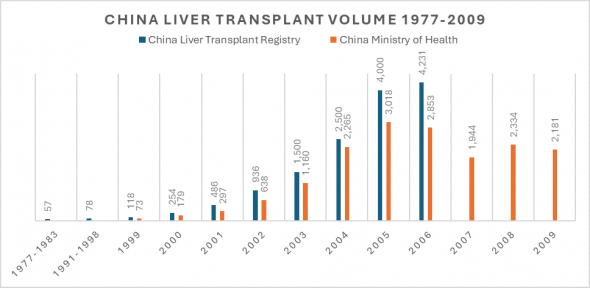
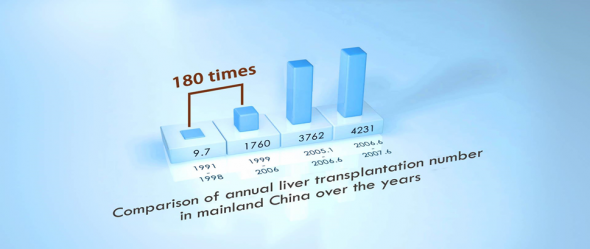
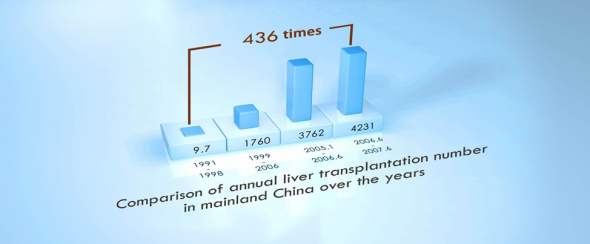
Chinese doctors perform other human organ transplants as well, including heart, kidney, lung and cornea and more.
Q: The Tianjin First Central Hospital is the largest transplant center in China and Asia. How many liver transplants did they perform?
A: From 1994 - 1998, 8 liver transplants were performed, averaging 1.6 cases per year.
1999 24 cases
2000 78 cases
2001 129 cases
2002 272 cases
2003 289 cases
2004 800 cases (or 507 from another media outlet)
2005 647 liver transplants and 436 kidney transplants
Phoenix Weekly reported that tens of thousands of foreigners went to China for organ transplants before 2006.
“In addition to Koreans, Tianjin First Central Hospital (aka. Orient Organ Transplant Center) also has patients from nearly 20 other countries and regions in Asia, including Japan, Malaysia, Egypt, Pakistan, India, Saudi Arabia, Oman, Hong Kong, Macao and Taiwan.” Mainland China has become an emerging center for organ transplants worldwide.
Investigator: Does your hospital do many liver transplants this year?
Doctor: Our hospital has a few hundreds of liver transplants a year.
{A doctor from Liver Transplant Department of Oriental Organ Transplant Center, Tianjin First Hospital, July 21, 2016}
Investigator: How many liver transplants have you done this year (2016)?
Doctor: A few hundred,.
Investigator: Is it one hundred or two hundred? Could you be more specific?
Doctor: 3-400 cases. {A doctor from Liver Transplant Department of Tianjin First Hospital, January 1, 2017}
Investigator: Does Tianjin First Central Hospital have the largest volume nationally?
Dr. Yang Han: It’s large. They report but not their actual data. So, there is no way to know how many they did. {Dr. Yang Han from Liver Transplant Department, The First Affiliated Hospital of Zhengzhou University, June 2, 2018}
There’re many other large transplant centers and each one performs a few hundred a year too. The total volume could be much higher than we can imagine.
Q: How many organ transplant hospitals does China have?
A: It’s estimated that almost 900 hospitals and around 10,000 doctors across China are suspected of having participated in the live organ harvesting crime.
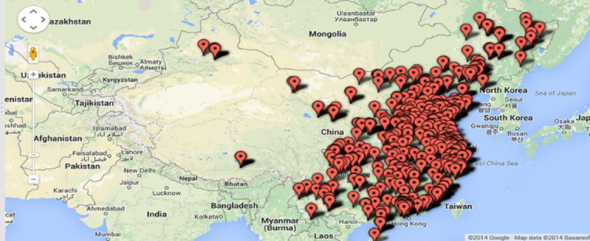
Distribution Map of Hospitals Suspected of Being Involved in Live Organ Harvesting
Q: Are Chinese military hospitals involved in organ harvesting?
A: Yes. Almost all military and armed police force hospitals are involved. In China, the armed police force guard the detention centers and prisons. From the start of the persecution, an order to harvest Falun Gong practitioners’ organs was sent to the military logistics department. They supervise the military medical system. The numbers of transplants we can find are only reported by civilian hospitals. It’s estimated that the organs harvested by military hospitals are huge.
Q: What’s the average organ wait time in China?
A: From 2 weeks to 1 month.
Q: Is it true, Chinese hospitals can find several matching organs very quickly?
A: Yes. It appears they have a big organ pool where they can select organs for patients any time. Here’s an example.
Chinese media outlets reported on September 28, 2005, Dr. Huang Jiefu decided to perform a liver transplant for a patient at the First Affiliated Hospital of Xinjiang Medical University. He called two hospitals, both more than 1,400 miles away, to request matching livers be put on standby, in case the transplant failed. Within several hours, each hospital found an organ and the first organ was delivered the next day. Considering the long distance transportation and liver viability time (8-12 hours), the standby organs were likely standby living people.
Q: Is it true, some Chinese medical research papers indicated doctors might kill people for organs in the operation room?
A:Yes, and it’s really alarming! Many examples of such cases can be found in Chinese medical research papers. Here is an example.
“Steps of operation: After the donor was wheeled into the operating room, routine surgical anesthesia was administered and a breathing tube was inserted; methylprednisolone (1g) and heparin (3mg/kg) were infused through intravenous lines. Once the anesthesia took effect, it was followed by thorough cleaning of the surgical incision site and surgical draping.. A large incision in the middle of the chest was made, followed by a conventional surgical method to penetrate the pericardium…”
|
Thinking Points …
|
a) Was the routine surgical anesthesia necessary for a dead donor?
b) A dead donor should be mechanically ventilated for organ viability before being
brought to the operation room. Why didn’t they do that until organ extraction started?
Q: When did the CCP admit they use death row prisoners’ organs?
A: Although it’s a well-known secret, the CCP didn’t admit it until November 2006, after the forced live organ harvesting crime was first exposed in July 2006. Their admission was intended to shift the world’s attention from Falun Gong practitioners to death-row prisoners.
Q: Could the number of executions explain the exponential increase in organ transplants?
A: No. The CCP’s average annual execution rate decreased after 1999. According to Amnesty International annual reports: from 1995 to 2005, on average, the annual number of executions in China was approximately 1,600. Even if the actual numbers were much higher, that would still fail to explain the exponential growth of organ transplants in China since 2000.
Q: When did China establish an organ distribution system?
A: The nationwide organ allocation system was established in 2011.
Q: Without a distribution system and organ donations, how could hospitals find healthy prisoners quickly?
A: A medical research paper, published in 2019, said Wuxi People’s Hospital performed 100 lung transplants between September 2002 and January 2011.
Source - Dr. Chen Jingyu, a top lung transplant surgeon, and others, 100 Cases of Lung Procurement for Lung Transplantation (Cold Ischemia Time > 6h) and the Prognosis Effect of Lung Volume Reduction, Chinese Journal of Tissue Engineering Research, January 29, 2019, Vol. 16 (5)
However, the 100 lung transplants were done before the city created an organ donation program. On January 10, 2017, a local newspaper, Wuxi Daily, reported, “Wuxi City was chosen as part of a national organ donation pilot project in July 2011… from July 2011 to January 2017, the whole city had merely a total of 29 organ donors.”
|
Thinking Points …
|
1.Lungs are susceptible to various infections and diseases. Many death row prisoners are
heavy smokers and most of their lungs wouldn’t be suitable for transplant.
2.Lungs should be transplanted a maximum of 4-6 hours after removal. The shorter, the
better. A lengthy, time-consuming administrative process is required after execution. Also, transportation time could hurt the feasibility of extracted lungs.
3.How could they find 100 matching organs from healthy executed prisoners nearby while
there are no reported local donations?
Q: Are Chinese people willing to donate organs?
A: No. Traditionally, Chinese people believe taking out someone’s organs after death is the most disrespectful thing one can do to the deceased. They also believe it brings bad luck to their families. This belief system has been an enormous barrier to the development of the voluntary donation of organs in China.
Q: When did China start organ donation programs?
A: The first organ donation pilot program started in 2010.
On January 1, 2015, China announced voluntary donation is the only legal way to source organs. This announcement is known to be a lie.
Q: After a few years of organ donation promotion, did Chinese citizens become willing to donate their organs?
A: No. The number of registered donors increased but the actual organ donations are still low.
So, it’s a lie that Chinese hospitals use organs from donations for transplants.
Q: If organ donations are low, did this affect the transplant volume?
A: No. Organ wait time and volume weren’t much different.
Q: Is it true, China has free organ transplant promotions?
A: Yes. Here are two examples.
1) In April 2006, Hunan People's Hospital launched a promotion of 20 free liver and kidney organ transplants.
|
Thinking Points …
|
2) From June 1 to June 30, 2017, the First Hospital at Jilin University ran a program offering 10 free liver transplants to children. On June 13, 2017, when undercover investigators made calls to the hospital and enrollment representatives, they confirmed the free liver transplant program was real.
How does China have so many organs that sometimes, they can give them away for free? Where did they come from?
Q: Why do Chinese doctors help the CCP to murder people?
A: The main reason is greed. Surgeons make a lot of money from organ transplants.
Q: Generally, do Chinese citizens know about the live organ harvesting crime?
A: The CCP only tells the public what they want them to know. So, there are 2 groups of people there. Those who don’t know anything about forced live organ harvesting, and those who know something but are afraid to speak out against it.
Q: What is an emergency liver transplant?
A: An emergency liver transplant is when a patient has a life-threatening condition, acute liver failure, and a transplant is the only available life-saving treatment.
2006 Annual Report on China Liver Transplant Registration looked at the percentage of emergency transplants in China. It was based on data from 29 transplant centers enrolled in the China Liver Transplant Registry. The data was collected between April 2005 and December 2006.
According to the report, there were 8,486 liver transplants in China during that period. 4,331 received a designation of either emergency or non-emergency. (The other 4,155 liver transplants didn’t have any designation.)
Of those that received a designation, 1,150, or 26%, were emergencies.
|
Type of Surgery |
Number of cases |
% |
|
Elective Surgery |
3,181 |
73.4 |
|
Emergency Surgery |
1,150 |
26.6 |
|
Total |
4,331 |
100 |
Here is an example of a short wait time for an emergency liver transplant, only 4 hours.
“In the past three years, our department treated 120 patients with severe liver hepatitis on an emergency basis; the success rate was very high, 76.2%. Due to many factors these patients didn’t consent to getting a transplant until the disease was very advanced and their condition had become too late for a normal transplant… on average their life expectancy was only three days at the time of their transfer to our hospital. An emergency transplant was the only option to treat these patients. The shortest wait time for an emergency liver transplant was 4 hours after admission.”
{Source::Dr. Fu Zhiren and Dr. Ma Jun, Organ Transplant Department of Shanghai Changzheng Hospital, Prognostic factors and management of emergency liver transplantation for severe hepatitis, Clinical Surgery Magazine, June 2006}
Q: How does brain-death relate to forced live organ harvesting ?
A: China lacks specific legislation to regulate brain death diagnosis and management. In reality, Chinese hospitals continuously declare patients brain-dead in order to use their organs.
Q: Did many Chinese hospitals still perform transplants during the lockdowns of Covid-19 pandemic?
A: Yes. Some didn’t stop and had no decrease in transplant volumes. Some had a short suspension and resumed it after a few months. After the lockdown was lifted, the number of organ transplants increased.
Q: What’s the impact of forced live organ harvesting crime?
A: In September 2013, Director Zhao of the “610 Office” in Ji County, Tianjin admitted that the organs and cadavers of Falun Gong practitioners and others were trafficked by Chinese officials and their relatives. Organ transplants and its derivative businesses are worth billions of dollars every year.
In 2013, a 6-year-old child, in Shanxi, went missing and two days later, was found with eyes gouged out for corneas. The victim kept asking, “Why isn't it daytime yet”?
On August 31, 2009, a Chinese media outlet reported the Third Affiliated Hospital of Zhongshan University was involved in stealing homeless people’s organs.
In 1995, 20-year-old Nie Shubin was sentenced to death six months after being arrested for rape and murder. A whistleblower said that, despite insufficient evidence to convict him, Nie was executed because a high-ranking official needed his kidneys to extend their life. In 2005, although the real rapist confessed, the presiding court refused to exonerate Nie until 2016, more than 20 years after his murder.
On November 22, 2016, it was reported by foreign media, the CCP secretly removed Peng Ming’s organs. Peng is a Christian.
In recent years dozens of university students in Wuhan disappeared without a trace. In the last couple of years, teenagers have suddenly gone in different provinces. The CCP flagrantly destroys the bottom line of morality with lies, coercion and financial lures that aim to silence and lead people to fundamental destruction without taking action.
Q: How can you help stop the evil crime?
‣ Thoroughly inform yourself about the CCP’s crimes. Encourage lawmakers to take legal action against any visiting Chinese doctors, police officers and government officials suspected of being involved in illegal organ harvesting. That means writing your Congressional representatives and signing petitions. If we don’t say anything, it’s going to keep happening.
‣ Silence gives consent. So, clarify the truth about the CCP’s forced live organ harvesting from Falun Gong practitioners to everyone within your sphere of influence.
Q: Where can I find more information?


